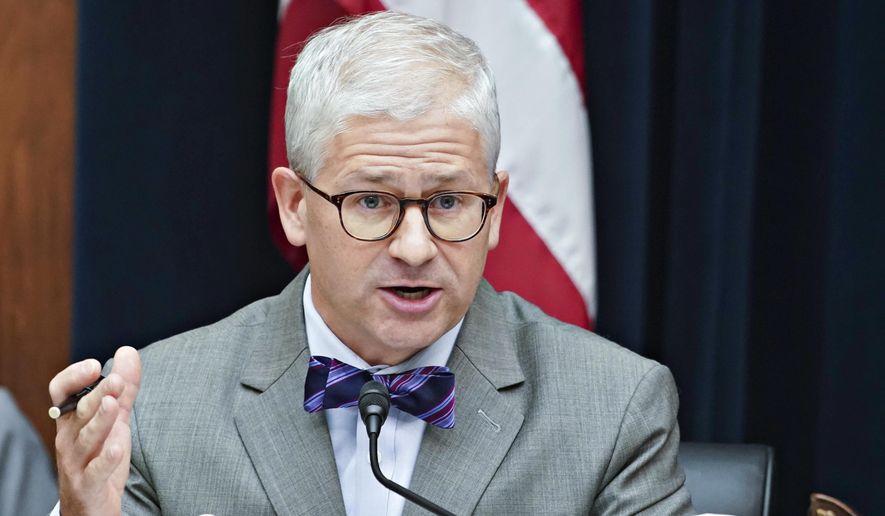Republicans hold the reins of the House Financial Services Committee and have no plans to kill off a Democratic relic that prioritized diversity and inclusion on the panel.
Rep. Patrick McHenry of North Carolina, the chairman of the House Financial Services Committee, announced two weeks ago that six of the panel’s subcommittees will press ahead on “diversity and inclusion” as key priorities throughout the committee. But Republicans did eliminate a subcommittee specifically dedicated to those goals.
“For four years, Democrats wasted the valuable and limited time and resources of our committee to push burdensome mandates on American job creators. Democrats’ goal was to name and shame companies until they parroted their woke social agenda,” Mr. McHenry said in a statement to The Washington Times.
Under his leadership, he said, the GOP will “refocus the Committee on the kitchen table issues that matter most to American families, from charting a path out of the dismal Biden economy to expanding opportunities for all Americans.”
Mr. McHenry said the creation of a digital asset subcommittee and the returning subcommittees “will allow Republicans to address the most pressing issues for our financial system and the American people—rather than simply messaging.”
Diversity and inclusion are two parts of the activist-supported Diversity Equity and Inclusion agenda, often referred to as DEI. Democrats and their liberal allies have pressured the government, schools and the private sector to establish it as a mandated policy.
Conservatives have fought against these measures in recent years across the country in public schools, businesses and government. Additionally, Republicans campaigned against Democratic DEI policies during the 2022 election, deriding them as too “woke.”
But the committee’s website shows that the subcommittee on Capital Markets, chaired by Rep. Ann Wagner of Missouri, will have jurisdictions including “identifying best practices and policies that continue to strengthen diversity and inclusion in the capital markets industry.”
The subcommittee on Financial Institutions and Monetary Policy, chaired by Rep. Andy Barr of Kentucky, also will cover “identifying best practices and policies that continue to strengthen the financial industry’s commitment to diversity and inclusion.”
Likewise, the subcommittee on Digital Assets, Financial Technology and Inclusion, chaired by Rep. French Hill of Arkansas, says it will identify “best practices and policies that continue to strengthen diversity and inclusion in the digital asset ecosystem.”
Rep. Blaine Luetkemeyer of Missouri chairs the subcommittee on National Security, Illicit Finance, and International Financial Institutions, which will identify “best practices and policies that continue to strengthen diversity and inclusion within the national security and international finance industry.”
Rep. Bill Huizenga of Michigan chairs the subcommittee on Oversight and Investigations. That panel will oversee “all agencies, departments, programs and matters within the Financial Services Committee’s jurisdiction, including agency and programmatic commitment to diversity and inclusion policies and best practices.”
Finally, the subcommittee on Housing and Insurance, chaired by Rep. Warren Davidson of Ohio, plans to identify “best practices and policies that continue to strengthen diversity and inclusion in the housing industry.”
During the last Congress, when Democrats held the majority, Rep. Maxine Waters of California chaired the committee, and she created a subcommittee focused exclusively on diversity and inclusion. But the GOP eliminated that subcommittee in this Congress, replacing it by adopting the two priorities among all six subcommittees.
Ms. Waters was not pleased, however, with the changes. In a statement, she said she is “deeply disappointed” and “disturbed” that committee Republicans would eliminate the subcommittee.
“In fact, their pledge to make diversity a component of each sub-panel is simply insufficient. We know that a diversity and inclusion strategy with no tangible goals, accountability measures, or a senior point of contact, rarely leads to significant impact,” Ms. Waters said. “Corporate America has recognized the need for institutionalizing and centralizing diversity and inclusion by establishing Chief Diversity Officers within their ranks and creating offices and infrastructure around these high-ranking individuals.”
• Kerry Picket can be reached at kpicket@washingtontimes.com.




Please read our comment policy before commenting.